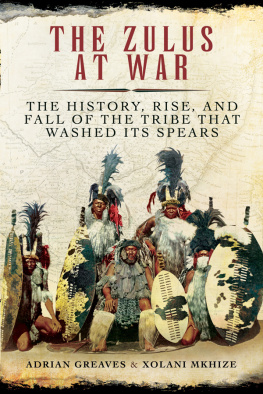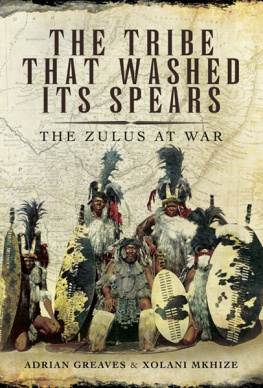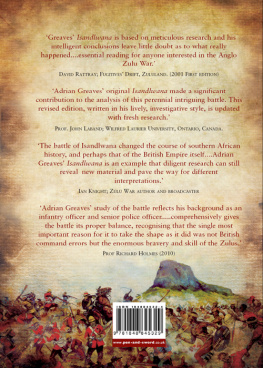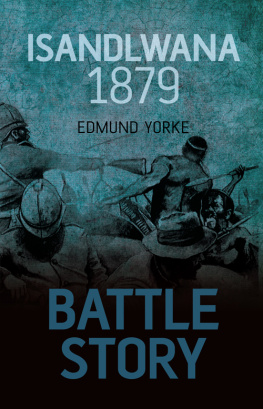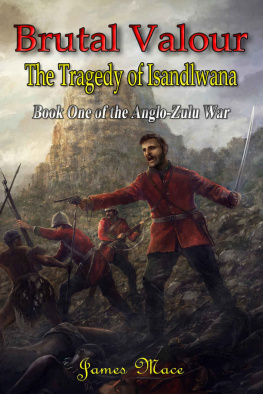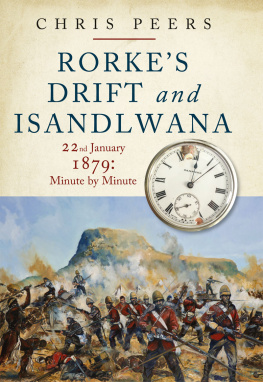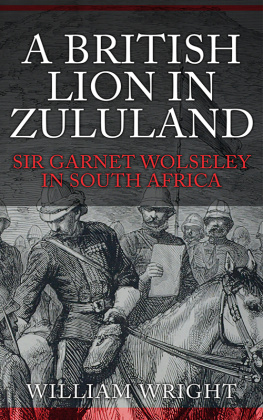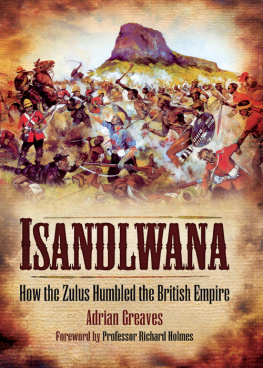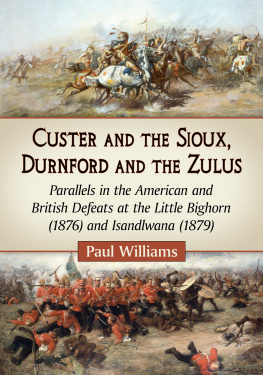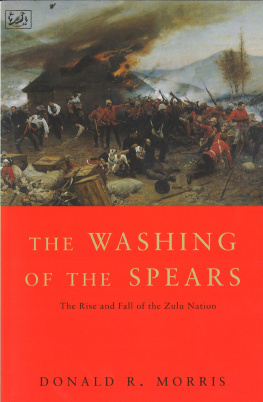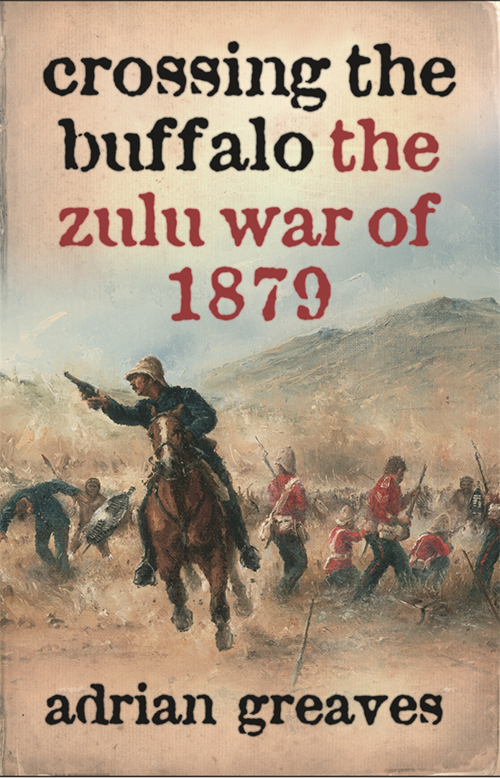Dr Adrian Greaves has a PhD in South African history and is the editor of the Anglo Zulu War Historical Society journals. He regularly lectures on the Zulu Wars both in the UK and abroad, and is the author of several books on the subject, including Isandlwana and Rorkes Drift. He is married with three sons, and lives in Kent.
In 1879 Queen Victorias military planners and politicians were actively preparing Britain for war in Afghanistan when, without their knowledge or the authority of Parliament, the British Army in South Africa invaded Zululand. The first the home government and people knew of the invasion was when devastating news reached London that part of Lord Chelmsfords well-trained invasion force had been destroyed by the Zulus at the battle of Isandlwana.
The battle lasted less than two hours but 4,000 bodies now lay across the British position. Dead Zulus, many blasted by volley fire and artillery, lay intertwined with slaughtered British soldiers. The ghastly blood-smeared debris of war littered the battlefield; Zulu war shields and spears lay tangled with Martini-Henry rifles, wrecked tents and wagons. Not content with a resounding victory and before the last British soldier had died, the victorious Zulus set about stripping the dead and dying soldiers for their red jackets then adding to the horror by ritually disembowelling their bodies. When viewed that night by Lord Chelmsford and the passing survivors of his invasion column, the horrific scene seared itself into their memories and ensured the resulting war would be merciless.
Chelmsfords unexpected defeat involved the loss of nearly 1,300 well-trained officers and men, including the near annihilation of the prestigious 1/24th (Warwickshire) Regiment together with many hundreds a total of 76 officers and 1,007 British troops were killed in action during the campaign and 37 officers and 206 men seriously wounded; a further 17 British officers and 330 men died of disease and throughout 1879 a total of 99 officers and 1,286 men were invalided from active duty for causes incidental to the campaign which unashamedly included numerous well-documented cases of psychological stress and battle fatigue. Officially, 604 African auxiliaries supporting the British were killed a figure that is probably grossly underestimated as records relating to the auxiliaries were deficient in every respect; this figure would just about account for their losses at Isandlwana. Equally tragic is the fact that Zulu losses throughout the war can only be estimated, with historians calculating that well in excess of 10,000 warriors were killed with a similar number maimed by Martini-Henry bullets, artillery rounds or by the swords and lances of the cavalry.
In three major engagements, Isandlwana, Ntombe and Hlobane, the British invasion force suffered unexpected and crushing defeats and in each of these battles only a handful of British soldiers survived to tell of their ordeal; conversely, at Rorkes Drift, Khambula, Gingindlovu and Ulundi, it was the turn of the Zulus to suffer overwhelming defeat.
Even today the memory of this conflict is still powerful, especially at the unchanged and haunting battlefields across Zululand. It is easy to visualize disciplined lines of young red-coated British soldiers, hopelessly outnumbered yet bravely standing shoulder to shoulder to defend Queen The war also received greater newspaper coverage from on-the-spot reporters than any previous colonial war.
In order to understand the significance and consequences of the seven major battles that constituted the Anglo-Zulu War, this book will necessarily pivot around the numerous accounts of conspicuous bravery and heroism on both sides. Some participants won medals while others, equally deserving, were deliberately overlooked. Both press and Parliament gloated over their troops successes, or were appalled by their defeats, and all the while the war that should have served to strengthen Britains reputation for being all-powerful throughout the world instead revealed serious military weaknesses in her chain of empire. Furthermore it was a war that was as unnecessary as it was unjust; Britain invaded the territory of her friend and ally, King Cetshwayo of the Zulus, much to his everlasting puzzlement. Within six months the war had cost the Zulu people a whole generation of young men and as proof of its being an utterly pointless war, following the final ruthless victory against the Zulus at Ulundi, the British Army about-turned out of Zululand and marched for home. Worse was to come; only weeks later British troops captured King Cetshwayo and exiled him to Cape Town, leaving his leaderless and starving people to the modern African fate of famine and civil war.
Nevertheless, the image of these soldiers, fighting fearlessly for their queen and country in the intense African heat, is immensely powerful and one that is regularly strengthened with each showing of popular and epic films such as Zulu and Zulu Dawn which depict the two famous battles of Rorkes Drift and Isandlwana; yet there is infinitely more to the Zulu War than these two battles in isolation. What of the daunting Zulu foe so feared and yet so respected by the British soldiers? Why were the British in South Africa, or more to the point, why did they invade Zululand? How was it that at Isandlwana an inexperienced part-time and poorly armed warrior army, which had been at peace for twenty-two years, managed to inflict such a devastating defeat on one of the most modern, well-equipped professional armies in the world? How, indeed, were they able to follow this victory with further triumphs at Hlobane and Ntombe River? Also to be considered is the mysterious role and death in Zululand of the French Prince Imperial while in the service of the British. And having finally routed the Zulu army at Ulundi and laid waste the countryside at such enormous cost to both sides, why did the British then abandon Zululand to its fate?
This book will consider not only these questions but also the whole Anglo-Zulu War in the light of modern research, including that of recent archaeological examinations at the more accessible battlefields. Walking the largely unchanged battlefields of Zululand is always a moving experience and extremely useful when trying to enter the mind of the participants, but much more material can still be discovered by examining primary and secondary sources, including official army maps and volumes of beautifully drawn sketches, and newspaper and journal articles from those hardy news reporters and military artists who accompanied the army during the invasion. Yet it is the official reports and letters from the participants themselves that are most valuable source of fresh material. Both officers and soldiers, at least those who could write, wrote from the heart: of the battles, the conditions and hardships endured, the extremes of weather and of their experiences, fear and terror of pending battle. Even with the lapse of time, all these emotions pour forth from their letters; after all, this was one of the last wars without any form of official censorship. Although many of these letters are now housed in a number of fine military museums, many still remain in private hands, the property of proud descendants of men who took part in the Zulu War. It is due to the generosity of all the guardians of these poignant letters, both official and those still held by the participants descendants, that new information, different aspects and fresh interpretations of the Zulu War continue to emerge.


